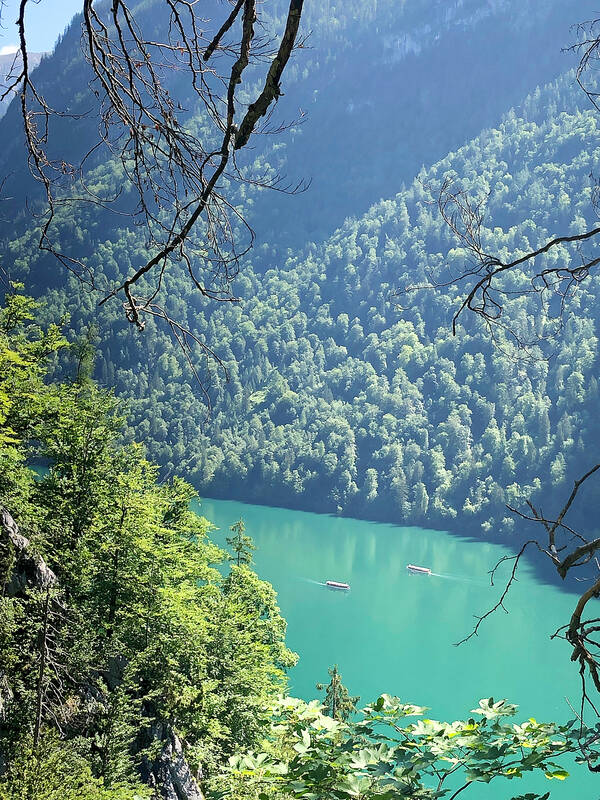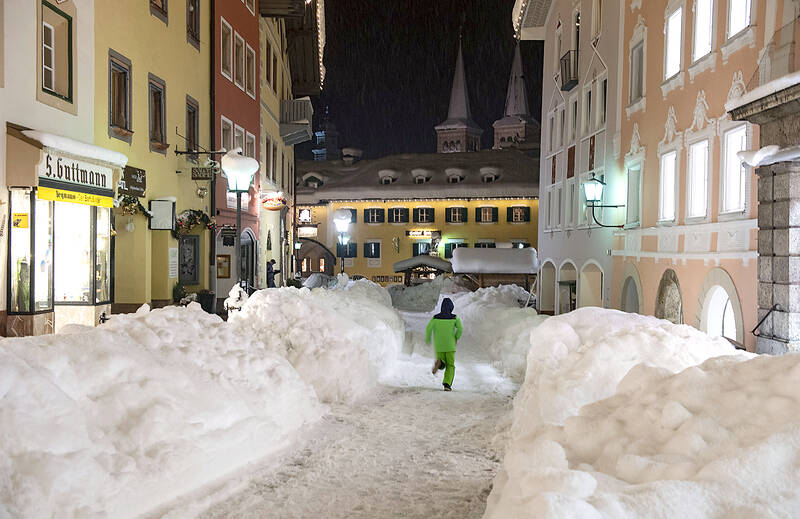The punch that floored Joseph Brandner, 34, at 11.30pm on Aug. 24 was the start of it all. Three men wearing Division Deutschland T-shirts, a brand associated with neo-Nazis, had walked up behind him as he was enjoying a drink with friends at a beer table outside the Kuckucksnest bar in the Bavarian alpine town of Berchtesgaden.
Brandner — who has been learning-disabled since being hit by a car at the age of 17 — was sucker-punched to the ground. “Wankers!” screamed his tattooed assailant. “Come on — three on three.”
Brandner’s two friends, including the owner of the bar, Jakob Palm, 33, hurriedly picked him up and took him inside. Two of the attackers were found later by police. The men, in their 20s and 30s, were visiting from northern Germany. The slow wheels of justice continue to grind.

Photo: AP
It was a traumatic episode, the sort of random violence not experienced in this quiet conservative community of 8,000 people for many years, but it was also a moment of epiphany for Palm and others.
A video of Palm describing what happened has been viewed 15,000 times on Instagram. A meeting of about 40 concerned people was held at the Kuckucksnest and a resolution was made. “I think it’s very important to say: ‘You don’t get this village back — this historical spot is gone for you forever,’” said Palm, a father of a four-year-old son and two-year-old twin daughters, speaking of the birth that day of a citizens’ initiative known as Berchtesgaden Against the Right. The punch of Aug. 24 burst “the bubble” of Berchtesgaden’s complacency, Palm said.
“The fact that many people from relevant rightwing circles are making pilgrimages to Obersalzberg again today is a thorn in the side of many in the Berchtesgaden valley basin,” a website set up by the initiative says. “Our goal is to take a clear stand for a democratic and cosmopolitan society in times of rightwing extremist activities and attacks.”

Photo: EPA-EFE
It is inevitable that Berchtesgaden, the chocolate-box pretty town high in the German alps, will be for ever associated with Adolf Hitler. He first came to the Obersalzberg, the mountainside area above Berchtesgaden, in 1923, and went on to buy Haus Wachenfeld, a modest chalet that would be steadily expanded as his power grew.
By 1936, the Berghof, as it was renamed, was the German Fuhrer’s second seat of power after Berlin, amid a complex of private and government buildings where he spent a quarter of his time as chancellor.
Hitler’s closest acolytes, Martin Bormann, Albert Speer, Hermann Goring, requisitioned or built neighboring homes. It was at the Berghof that Hitler hosted Lloyd George, Neville Chamberlain and the former King Edward VIII and his wife, Wallis Simpson.
From its “great room,” overlooking the snow-capped Untersberg massif, Hitler launched the invasion of Poland in September 1939, plotted Operation Barbarossa against the Soviet Union and executed the siege of Leningrad at the cost of the lives of 800,000 of its inhabitants.
Hitler’s sister Paula, who died in 1960 at the age of 64, is buried in Berchtesgaden’s cemetery but little else remains of that dark chapter in history. The Berghof was damaged in a British air raid on 25 April 1945 and burned down by the Obersalzberg SS a few days later. The postwar US military government ordered the ruins to be blown up in 1952 to avoid it becoming a shrine, with fast-growing trees planted over them. A foundation wall is all that remains today.
It has, however, always been a place of pilgrimage for some — and the numbers appear to be on the rise.
The Dokumentation Obersalzberg, a museum 300 meters from the Berghof site, reopened in October after a €30 million (NT$1.01 billion) expansion with the express intent of contrasting the idyllic surroundings to the crimes ordered here.
On its opening day, one visitor scrawled in the visitors book: “Das ist das wahre Deutschland stolz national’“ (This is the real Germany, proudly national).
Lena Thurnhausstatter, 25, an education officer at the museum, said it was not a daily occurrence but that she had collected Post-it notes in the last few days daubed with antisemitic comments. They had been stuck to the museum’s “participation wall.” Some of them referenced the war between Israel and Hamas.
All this comes at a time when far-right views are on the ascendancy across Germany, with the anti-immigration Alternative fur Deutschland party boasting continued electoral success. Local center-right parties have also played with extremist language. The accommodation of asylum seekers in local hotels has provoked concerns.
“It has never been broken,” said Norbert Egger, 67, of the hold of far-right views on some parts of German society. The old prejudices were never far from the surface, he claimed, noting that the golf club near the Berghof, of which Egger has been chair in recent years, had been established in 1955 on 20 April — the day of Hitler’s birthday.
A protest rally was organized by the initiative in September. About 300 people marched through Berchtesgaden’s cobbled streets and were addressed in solidarity by the mayor, Franz Rasp, of the center-right Christian Social Union party (CSU). A night-time vigil was held in November for victims of the 1938 Kristallnacht pogroms. Further events were planned for Hitler’s birthday, including “a human chain” of people holding hands from one end of the town to the other, said Michael Gruber, 25.
More immediately, in the next few days, a first step will be made to rename Von Hindenburg Allee, a central street in Berchtesgaden named in 1933 after the-then German president in honor of his decision to make Hitler chancellor.
Palm’s great-grandfather was the mayor responsible, under duress, for making Paul von Hindenburg and Hitler “honored citizens.”
“As a family we all want that decision denounced [by the regional parliament] and for the street to be renamed,” he said. That it remains as it is is seen as evidence of a dangerous ambivalence.
“We are late but it is never too late to fight for democracy,” said Anna Stangassinger, 22.
The purpose is not only to dissuade unwelcome visitors but to ask all those who hold what may be unpalatable views to some to draw a line at violence. Palm said: “The answer to the country’s problems isn’t going back to nazism — it doesn’t get better with iPhones.”
Egger, a retired businessman who served in the air force “with the old Nazis as commanders and the young Nazis as colleagues,” said the cross-party effort offered hope that Germany could reject the poison of the past.
“From my point of view, in our risky situation in Germany, in contrast to 1933, all democrats have to work together against fascists,” he said. “We missed that in Germany 90 years ago but we shouldn’t make the same mistake again.”

Climate change, political headwinds and diverging market dynamics around the world have pushed coffee prices to fresh records, jacking up the cost of your everyday brew or a barista’s signature macchiato. While the current hot streak may calm down in the coming months, experts and industry insiders expect volatility will remain the watchword, giving little visibility for producers — two-thirds of whom farm parcels of less than one hectare. METEORIC RISE The price of arabica beans listed in New York surged by 90 percent last year, smashing on Dec. 10 a record dating from 1977 — US$3.48 per pound. Robusta prices have

The resignation of Taiwan People’s Party (TPP) co-founder Ko Wen-je (柯文哲) as party chair on Jan. 1 has led to an interesting battle between two leading party figures, Huang Kuo-chang (黃國昌) and Tsai Pi-ru (蔡壁如). For years the party has been a one-man show, but with Ko being held incommunicado while on trial for corruption, the new chair’s leadership could be make or break for the young party. Not only are the two very different in style, their backgrounds are very different. Tsai is a co-founder of the TPP and has been with Ko from the very beginning. Huang has

A few years ago, getting a visa to visit China was a “ball ache,” says Kate Murray. The Australian was going for a four-day trade show, but the visa required a formal invitation from the organizers and what felt like “a thousand forms.” “They wanted so many details about your life and personal life,” she tells the Guardian. “The paperwork was bonkers.” But were she to go back again now, Murray could just jump on the plane. Australians are among citizens of almost 40 countries for which China now waives visas for business, tourism or family visits for up to four weeks. It’s

A dozen excited 10-year-olds are bouncing in their chairs. The small classroom’s walls are lined with racks of wetsuits and water equipment, and decorated with posters of turtles. But the students’ eyes are trained on their teacher, Tseng Ching-ming, describing the currents and sea conditions at nearby Banana Bay, where they’ll soon be going. “Today you have one mission: to take off your equipment and float in the water,” he says. Some of the kids grin, nervously. They don’t know it, but the students from Kenting-Eluan elementary school on Taiwan’s southernmost point, are rare among their peers and predecessors. Despite most of